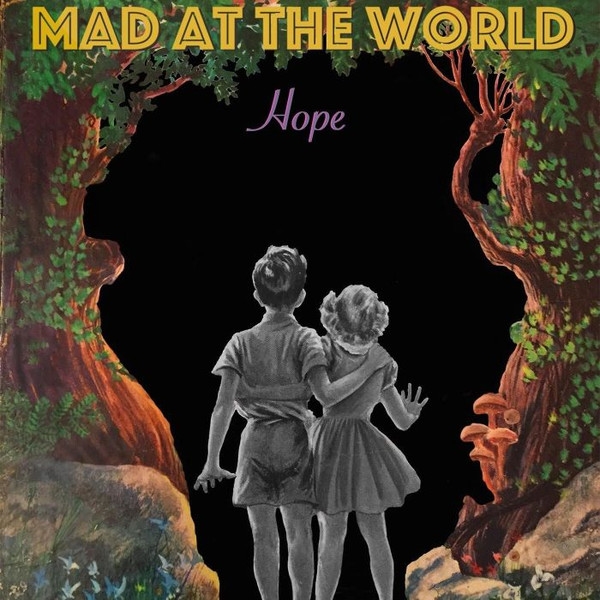
Mad At The World
Hope
Roger and Randy Rose from Mad at the World are back at it, with a powerful re-visit of their early synth-heavy albums. Being a fan of MatW and of good synth work, their album Hope fails to disappoint. The synth structures and sounds are reminiscent of the eponymous first album and the powerful subsequent release of Flowers in the Rain. Fans of 80s synth pop and industrial will find this album a treasure. While the influences from that time are strongly represented, the Rose bros. (I hope they will forgive the use of the phrase!) bring a fresh eye to the music and make it musically contemporary. The album's title, Hope, is befitting the overall sentiment and lyrical content. The writing is honest, inviting, and unapologetic in presenting their theological views. It's not preachy, yet a genuine expression of heartfelt sentiment. The first track, "Healing on Planet Earth," is a great introduction to the overall theme. While retaining a sadness and darkness MatW listeners are familiar with, the familiar sense of real, objective hope in the world that has ever served as a stamp of their music. This track is a pleading prayer asking for a return for love and understanding on Earth. A hopeful return of what we appear to have lost touch with and perhaps failed to expand, leaving it withering on the vine as it were. It finishes with a plea to Jesus to heal us again. "My Old Best Friend" is a send-off to one's old self and welcoming a renewal of heart. Very nice piano work in this, accompanied by some synth backgrounds. "You are Free" engages strongly in a celebration of the rchestral Hit' sounds common to the 80s, yet as strong as a sound as it is, it's pronounced yet not overbearing in this song. Perhaps it's best use is accomplished in this song. "I can't help but wonder if God is real, or I'm the one to blame, for all my shame" is a well-constructed lyric that is strong and very accessible. In some instances, it brings tears to one's eyes. The chorus, "you are free," is moving. "Moving In and Moving Out" has a very deep synth bassline line continually throughout. As great as all the synth work is in this, the bassline is a favorite feature in this song. The story of the song tells of a malfunctioning love relationship. The sounds of "Never Gonna Stop" is reminiscent of Depeche Mode's People Are People era, though more of a thoughtful reflective sound than D.M. expressed in their earlier material. This piece is about Jesus stating that he's "never gonna stop my love for you." Quite powerful. "Can You Feel My Pain?" Is a powerful representation of Jesus in the garden of Gethsemane expressed through contemplative piano work backed with strong synth. At least, that's what the reviewer feels the message is. Something to contemplate in the dark. "That's What He Said" has a great danceable synth backdrop. At least it's a head-bopping sentiment. The lyrics again are powerful. "There's no turning back. There's no going home. Everything about you, belongs to me. You're not your own." There's a bit of D.M. sounds in this as well, but definitely in a unique presentation. The D.M. is merely a garnish for the overall song here. A meditative, slow synth-bass wash defines the backing sound of "Just Beyond the Clouds of Grey." "A price too high to pay for, I'll be your currency." "Break Me Down" is a surrender to divine love. Very nicely constructed, pointing out a synth sound reminiscent of a 60s garage rock over the bass and synth background. Nice bassline too! It's got a alking rhythm' that works perfectly for the song's theme. "You Belong to Me" wraps up the theme of hope expressed in the title and encompassing the message of this album. Piano and synth work in this song is great. "Don't you know you belong to me? You always belong to me." Overall, many influences can be heard or almost identified, yet Mad at the World retains a uniqueness that separates them from any other band. I mentioned Depeche Mode as an influence, yet there are so many throughout from which they may have borrowed snippets from it's difficult to identify, and certainly would be an entire article unto itself. I thought to hear (consciously on their part or not) influences from 70s greats like 10cc and Steely Dan, although I suspect their musical knowledge accesses a catalog extending beyond that which many are familiar. I also think to hear touches of David Ball's excellent keyboard work from Soft Cell and perhaps a smidgen of Nitzer Ebb. This reviewer hopes to not take away anything from this album or the overall brilliance of the brothers Rose. The influences, real or imagined, take nothing away from this album. The art that is produced is its own unique, viable, and wonderful creation. The musicianship is remarkable, the lyrics heartfelt and evocative. From what can be gathered, it seems that this album is just the first of a series of albums to come from Mad at the World, expressing different eras of their sound in new and fresh ways. This sounds like an exciting prospect, and this album definitely enthuses one for future releases, and encourages a delving into their past material.